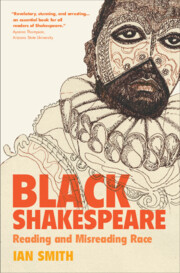Chapter 3 - Antonio’s “Fair Flesh” and the Property of Whiteness
Published online by Cambridge University Press: 08 September 2022
Summary
J. W. C. Pennington’s 1861 fugitive slave narrative documents a slave master rejecting a purchase offer for an enslaved man’s freedom, “would not receive the price of his pound of flesh,” preferring instead a dead black body as recompense. The verbal ties to Shakespeare’s The Merchant of Venice, reveal a textual distortion of the original where Antonio’s whiteness, identified by the playwright in the pound of Antonio’s “fair flesh,” has been rendered invisible through scholarly misreading. Consequently, Shylock struggles against a white-dominant society that denies him legitimacy because he, in early modern anti-Semitic parlance, is “not white as other men.” Since Jews were not allowed to own landed property, the debt bond creates a loophole whereby Shylock envisions a social restructuring that permits him to own whiteness as property and challenge the racially exclusionary principle on which property rights are predicated. Shakespeare’s use of the debt bond lays the historical foundation for the forcibly asserted rights in human property within the later plantation economy where the usurping property (meaning attribute) of whiteness takes substantial root in Western culture.
- Type
- Chapter
- Information
- Black ShakespeareReading and Misreading Race, pp. 79 - 116Publisher: Cambridge University PressPrint publication year: 2022

